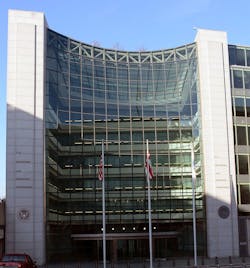Proposed SEC Rule would require Climate Risk and GHG Emissions reporting from publicly traded companies
The U.S. regulatory body overseeing publicly traded companies is considering a rule change which would require climate action and risk reports in filings.
The Securities and Exchange Commission’s new requirement, if approved, would compel companies to provide information on climate-related risks which could have a material impact on their business. It also would require details of a firm’s greenhouse gas emissions.
"I am pleased to support today’s proposal because, if adopted, it would provide investors with consistent, comparable, and decision-useful information for making their investment decisions, and it would provide consistent and clear reporting obligations for issuers," said SEC Chair Gary Gensler. "Investors representing literally tens of trillions of dollars support climate-related disclosures because they recognize that climate risks can pose significant financial risks to companies, and investors need reliable information about climate risks to make informed investment decisions.”
The proposed rules also would require a registrant to disclose information about its direct greenhouse gas (GHG) emissions (Scope 1) and indirect emissions from purchased electricity or other forms of energy (Scope 2), according to the SEC. In addition, a registrant would be required to disclose GHG emissions from upstream and downstream activities in its value chain (Scope 3),
Numerous and longtime oil and gas companies already are moving toward some levels of decarbonization in their resource mixes. Companies like Shell and ExxonMobil are pursuing projects in carbon capture, biofuels and hydrogen, among other initiatives.
Manufacturers such as the steel industry are looking at factory options such as electric arc furnaces.
However, industry advocate American Petroleum Institute’s top regulatory officer expressed questions about just how far the SEC might go beyond its stated rulemaking proposal.
“We are concerned that the commission’s sweeping proposal could require non-material disclosures and create confusion for investors and capital markets,” API Senior Vice President of Policy, Economics and Regulatory Affairs Frank Macchiarola said in a statement. “As the commission pursues a final rule, we encourage them to collaborate with our industry and build on private-sector efforts that are already underway to improve consistency and comparability of climate-related reporting.”
The proposed climate-oriented rule will be published in the Federal Register, then be open for public comment.
---
(Rod Walton, senior editor for EnergyTech, is a 14-year veteran of covering the energy industry both as a newspaper and trade journalist. He can be reached at [email protected]).
About the Author
Rod Walton, EnergyTech Managing Editor
Managing Editor
For EnergyTech editorial inquiries, please contact Managing Editor Rod Walton at [email protected].
Rod Walton has spent 17 years covering the energy industry as a newspaper and trade journalist. He formerly was energy writer and business editor at the Tulsa World. Later, he spent six years covering the electricity power sector for Pennwell and Clarion Events. He joined Endeavor and EnergyTech in November 2021.
Walton earned his Bachelors degree in journalism from the University of Oklahoma. His career stops include the Moore American, Bartlesville Examiner-Enterprise, Wagoner Tribune and Tulsa World.
EnergyTech is focused on the mission critical and large-scale energy users and their sustainability and resiliency goals. These include the commercial and industrial sectors, as well as the military, universities, data centers and microgrids. The C&I sectors together account for close to 30 percent of greenhouse gas emissions in the U.S.
He was named Managing Editor for Microgrid Knowledge and EnergyTech starting July 1, 2023
Many large-scale energy users such as Fortune 500 companies, and mission-critical users such as military bases, universities, healthcare facilities, public safety and data centers, shifting their energy priorities to reach net-zero carbon goals within the coming decades. These include plans for renewable energy power purchase agreements, but also on-site resiliency projects such as microgrids, combined heat and power, rooftop solar, energy storage, digitalization and building efficiency upgrades.

